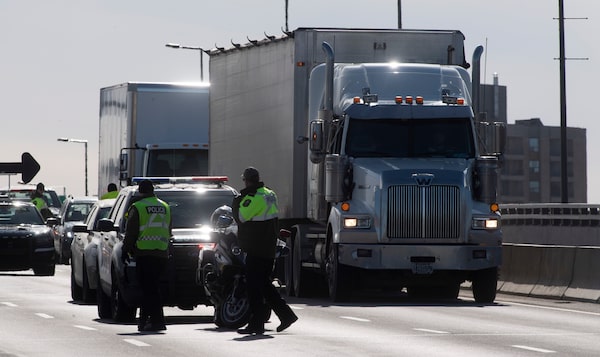
Trucks roll through a checkpoint in Gatineau, Que., on April 2, 2020.Adrian Wyld/The Canadian Press
Ottawa is closely monitoring the Canadian workforce – especially in the agricultural and transportation sectors – over worries the country’s medical and food supplies remain vulnerable to worker shortages caused by the COVID-19 pandemic, according to a federal document and government officials.
A federal contingency plan shared with provincial governments on April 8 warned that growing absenteeism in crucial sectors of the economy could lead to shortages of food, protective equipment and other essential goods, as well as soaring prices. The document was provided to the premiers with a letter from Prime Minister Justin Trudeau.
In several scenarios developed by federal officials, Ottawa could use the Emergencies Act to force the trucking, rail and air-cargo industries to give priority to transporting food and medical supplies. The document also showed the federal government is looking at the possibility of classifying some parts of the food and agricultural sector as essential services to compel them to continue production.
Coronavirus guide: Updates and essential resources about the COVID-19 pandemic
Mr. Trudeau’s letter to the premiers says the three sections of the Emergencies Act that could be used deal with the regulation or prohibition of travel within specific parts of Canada, the ability to direct some classes of workers to offer essential services and adding controls on the distribution of “essential goods, services and resources.”
Mr. Trudeau told the premiers he wanted to consult them on the eventual use of the act in case they felt overburdened by the pandemic. So far, Ottawa and the provinces have preferred to rely on the regular powers at their disposal to acquire medical equipment and safeguard food production.
Still, federal officials said the government continues to monitor key sectors daily to ensure the stability of food and medical supplies. The officials, whom The Globe and Mail is not identifying because they were not authorized to speak publicly on the matter, said the major concerns so far have been related to eventual shortages in remote communities such as those in the North, and a potential need for federal assistance in the eastern provinces.
Despite weeks of physical distancing, COVID-19 is still disrupting the Canadian economy. One of Canada’s largest slaughterhouses, Cargill Ltd.’s meat-processing plant in High River, Alta., halted operations this week after hundreds of people connected to the facility were infected with the novel coronavirus.
The Emergencies Act grants the federal government additional powers to protect public welfare and public order, and respond to international situations or war. The law also calls on the government to consult the provinces before using the powers and to submit the matter to Parliament within seven days of invoking the law. It also requires a subsequent inquiry into the use of the emergency powers.
Saskatchewan Premier Scott Moe, speaking for the other premiers, told the federal government on April 14 that “it is neither necessary nor advisable to invoke the [Emergencies] Act at this time.” Mr. Moe added the provinces feel that they can, in collaboration with Ottawa, “effectively manage through the COVID-19 pandemic.”
According to the April 8 documents, Ottawa has been concerned about a shortage of medical supplies and disinfectant caused by a bidding war between government and companies for masks, gloves and other protective equipment. In addition to health workers, the shortages could affect the agricultural sector and lead to factory closings, the document warned.
In that context, Ottawa said it could use the Emergencies Act to order Canadian manufacturers to prioritize deals with the medical and agricultural sectors, as well as to prevent companies from selling their production abroad unless it was not needed in Canada.
The document was shared with provincial governments shortly after the Trudeau government persuaded the Trump administration not to block a planned shipment of medical masks from 3M Co. that were made in the United States.
Mr. Trudeau said in March that using the Emergencies Act would be a last resort.
“One of the key elements of the Emergencies Act is that it’s an override over the provinces," he said. “It takes powers that are normally only in the hands of provinces or even municipalities and puts them at the federal level.”
One of the federal officials said the government will make every effort to avoid invoking the Emergencies Act, and that it has used the recent consultations with the provinces to look for gaps in their powers to deal with the pandemic.
Mr. Trudeau pointed out that the federal government does not intend to intrude on provincial jurisdiction, including health care. His letter to the premiers made it clear the provinces have key responsibilities over the agricultural sector and the food supply.
Sign up for the Coronavirus Update newsletter to read the day’s essential coronavirus news, features and explainers written by Globe reporters and editors.